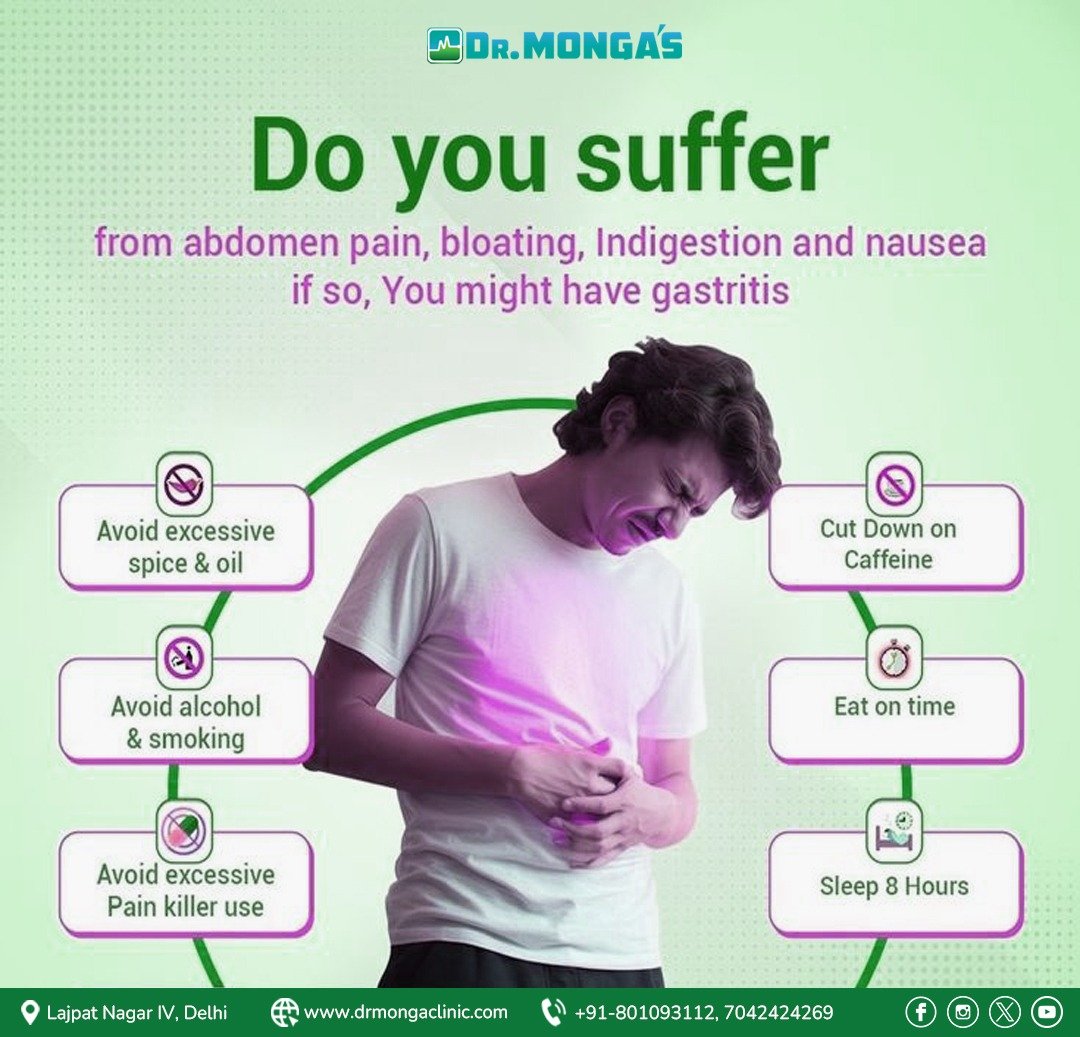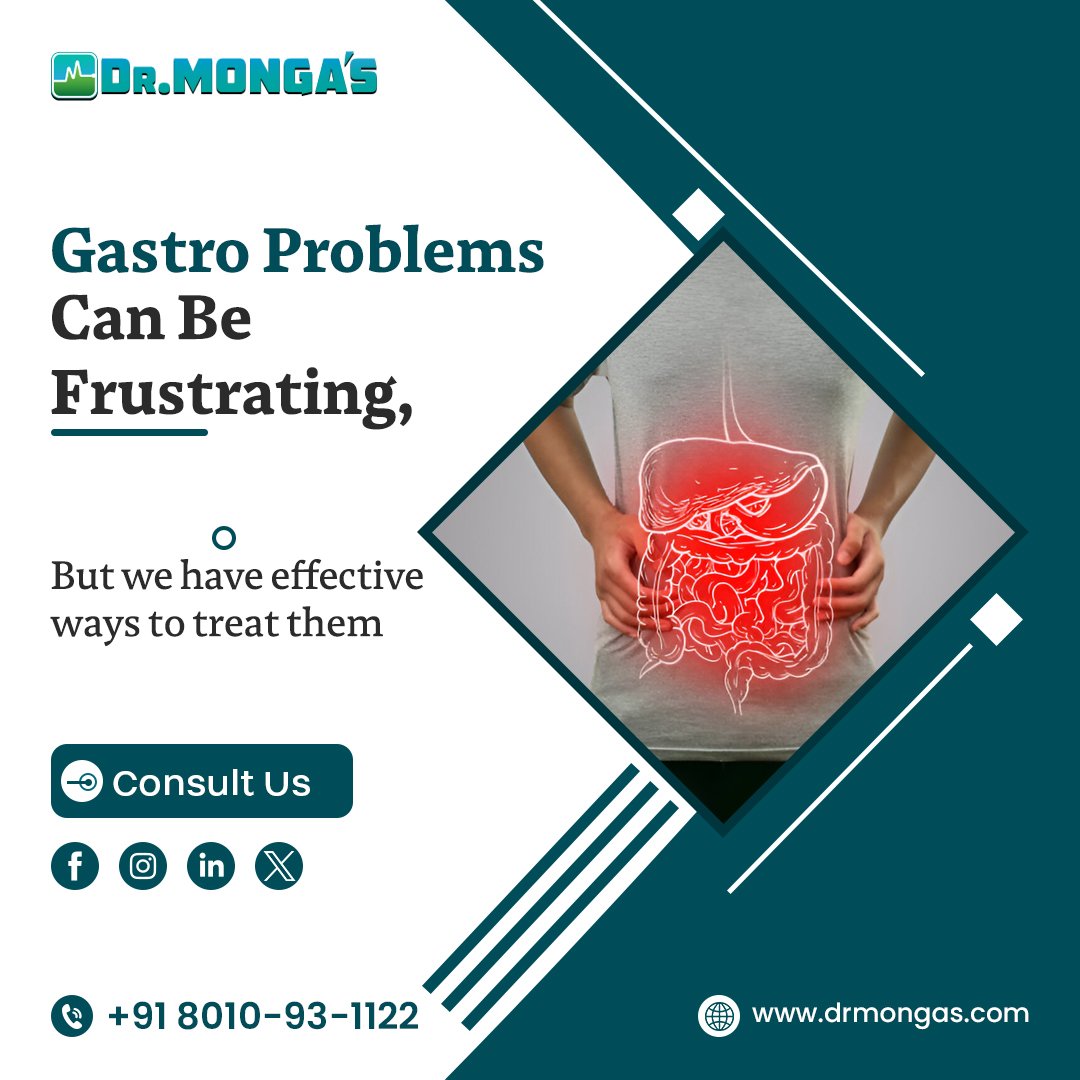Today, many people, adults, and kids, have gas or stomach issues. They are facing this problem due to their lifestyles.
The problem of gas does not sound big, but only the one who faces it can know the problems it causes.
Sometimes, even small children start having gas problems. In such a situation, they cry a lot. The main causes of gas in the stomach are poor eating habits and stomach issues.
If you have a gas problem and you are very troubled by it, then come and learn its causes from Dr. Monga Clinic.
This is due to unhealthy eating and a lack of exercise. This is the reason why the problem of gas troubles many people.
What is a Gastric Problem
Gastric problems are issues in the stomach and upper digestive system. These problems harm our health. They also hurt our enjoyment of food and daily routines.
Common gastric problems include bloating, acid reflux, and indigestion. More serious issues include gastritis and ulcers.
Gastric problems can arise from many factors, including diet, stress, and health issues.
Gastric problems can be bothersome. If you’ve felt full or had heartburn after a meal, you know.
Symptoms of Gastric Problems
Recognizing the symptoms of gastric problems can help you address them without delay. Some common symptoms include:
- Bloating is a painful fullness in your abdomen. It can come from gas or certain foods.
- Heartburn is a burning feeling in your chest. It can happen when stomach acid flows back into the esophagus.
- Indigestion: It often causes discomfort or pain in the stomach after eating.
- Nausea: Sometimes, gastric issues can lead to feelings of sickness or the urge to vomit.
- Gas: It’s common to pass gas through belching or flatulence. It can sometimes be called digestive issues.
These symptoms can vary in severity, and it’s essential to pay attention to the patterns you notice in your body. For instance, some foods might trigger your symptoms. Noting these can help you manage your gastric health.
Causes of Gastric Problems
Stomach gas comes mainly from swallowing air while eating or drinking. You release most of the stomach gas when you burp. Bacteria ferment carbohydrates, fiber, some starches, and some sugars in your small intestine. Undigested food remains in your large intestine, where gas is formed. Some of that gas is also consumed by bacteria. When you pass gas, the bacteria release the remaining gas.
Causes of Constipation and GERD
Constipation and GERD can cause stomach gas. It is most important to understand gastritis. Gastroesophageal reflux disease occurs when acidity builds up in the stomach many times. Stomach acid sometimes goes back into the tube that connects the mouth and the stomach. Acid reflux can irritate the lining of the esophagus. Patients suffering from this problem need to consult their specialist immediately.
Irritable Bowel Syndrome:
Irritable bowel syndrome is the cause of frequent gas formation in the stomach. Bacteria present in the small intestine are responsible for this. This causes gas formation. Due to this, bacteria start growing more in the small intestine. This condition causes gas in the stomach. It can also cause discomfort, stomach pain, and bloating. Gastric problems seem to be a very common term, but if seen, they are widespread in themselves.
Problem of Stones in the Stomach
Stones can also be a reason behind frequent gas problems in the stomach. Stones not only cause stomach pain, but gas also starts forming in large quantities. In that case, you need an ultrasound. It will find your stomach stone. Stones in the stomach can occur in the gallbladder, kidneys, and urinary tract. In such a situation, you may need treatment in time. This is also a major reason.
Consumption of High Carbohydrate Diet
Our food is first connected to our stomach. Thus, whatever we eat, its reaction starts. In such a situation, the consumption of foods with high carbohydrates can be harmful at times. Ineffective breakdown of carbs leads to indigestion in the stomach or colon. Then the intestinal bacteria start fermenting it; they form gas and cause flatulence. In such a case, remember to chew oats, bananas, sweet potatoes, and oranges well before eating. Chew roti with care. You should do exercise and physical activities after taking a high-carbohydrate diet.
High Fructose Foods
High-fructose foods cause gas. Fructose is usually absorbed in the small intestine. However, excessive fructose can harm the body. Bacteria ferment fructose. This releases hydrogen and methane gas, causing pain, bloating, flatulence, and diarrhea. Eating fruits like apples, grapes, and watermelon also causes this. Apart from this, consuming many sweet things is also harmful to the body.
Eating Processed Food
Eating processed food can cause gas. Along with the symptoms of gastritis, we should also pay more attention to its causes so that we can prevent it. Processed foods such as packaged bread, snacks, cereals, and chocolates cause gas. They contain a variety of ingredients, including fructose and lactose. This combination can increase gas. This can lead to digestive problems and diseases such as diabetes and high blood pressure. Eating them in large quantities or quickly can overload the system and give more food to bacteria, which leads to gas. This condition can cause discomfort by producing gas and bloating.
Lactose Containing Foods
People with lactose intolerance have trouble with anything made from milk. The body sometimes cannot fully digest the proteins and sugars found in milk. As a result, they have diarrhea, gas, and bloating after consuming dairy products. The body cannot digest the lactose present in it. This causes problems.
Eating or Drinking too Fast
Eating or drinking too fast can cause aerophagia. Swallowing excess air can lead to gas. This can cause bloating in the body. Bloating can also be a problem. This is usually caused by eating or drinking fast, chewing gum, or smoking. Therefore, it is important to understand the nature of gastritis. Also, burping is how most of the swallowed air escapes the stomach. The small intestine absorbs the remaining gas. A small amount passes into the large intestine before being expelled through the rectum.
Treatment of Gastric Problems
Treating gastric problems involves a combination of dietary changes, lifestyle adjustments, and, in some situations, medical intervention. Here are some strategies:
- Dietary Changes: Start by identifying food triggers and adjusting your diet accordingly. Keep a food diary if you need to!
- Hydration: Drinking plenty of water can help with digestion and minimize gas.
- Over-the-counter remedies: Products like antacids or simethicone can provide quick relief from symptoms such as bloating and gas.
- Probiotics: Introducing probiotics into your diet may help balance gut bacteria and improve digestion.
- Stress Management: Techniques like yoga or mindfulness can reduce stress, which is often a hidden factor in gastric problems.
- Consultation with a Doctor: If issues persist, your healthcare provider might recommend tests or prescribe medications to help manage your symptoms.
Having dealt with my own share of gastric hiccups, I’ve found that a simple elimination diet can be eye-opening. It allowed me to discover which foods really did not sit well with me.
In conclusion, your well-being needs to check your gastric health. If you notice any symptoms or patterns that concern you, it’s never too late to take action! Always feel empowered to seek help and make changes that lead to a happier, healthier tummy.
Gastric is a problem related to the digestive system in which there is a problem of gas formation in the stomach and improper digestion function.
Causes of gastric can include excessive gas formation in the stomach due to overeating, bad food, irregular eating, mistakes in eating, stress, and problems like gastritis.
Symptoms of gastric can include gas in the stomach, abdominal pain and feeling of discomfort, indigestion, indigestion, and heaviness in the stomach.
Gastric is diagnosed primarily based on the symptoms and initial examination of the patient, which may include abdominal examination, patient’s medical history, and lab tests.
Treatment of gastric can include avoiding improper eating, medicines, measures to increase digestive power and yoga.
Preventive measures for gastric may include eating on time, maintaining a healthy diet, drinking more water, and managing stress.
Tests like abdominal examination, margin examination, gastroscopy, and blood test can be done for gastric.











Leave a Reply